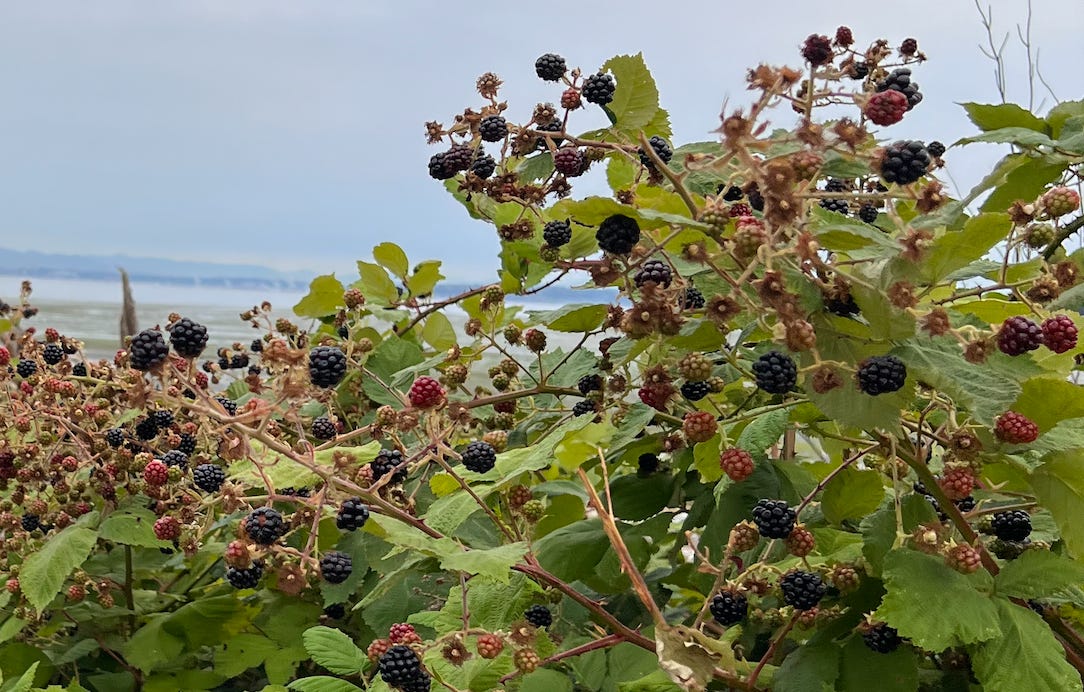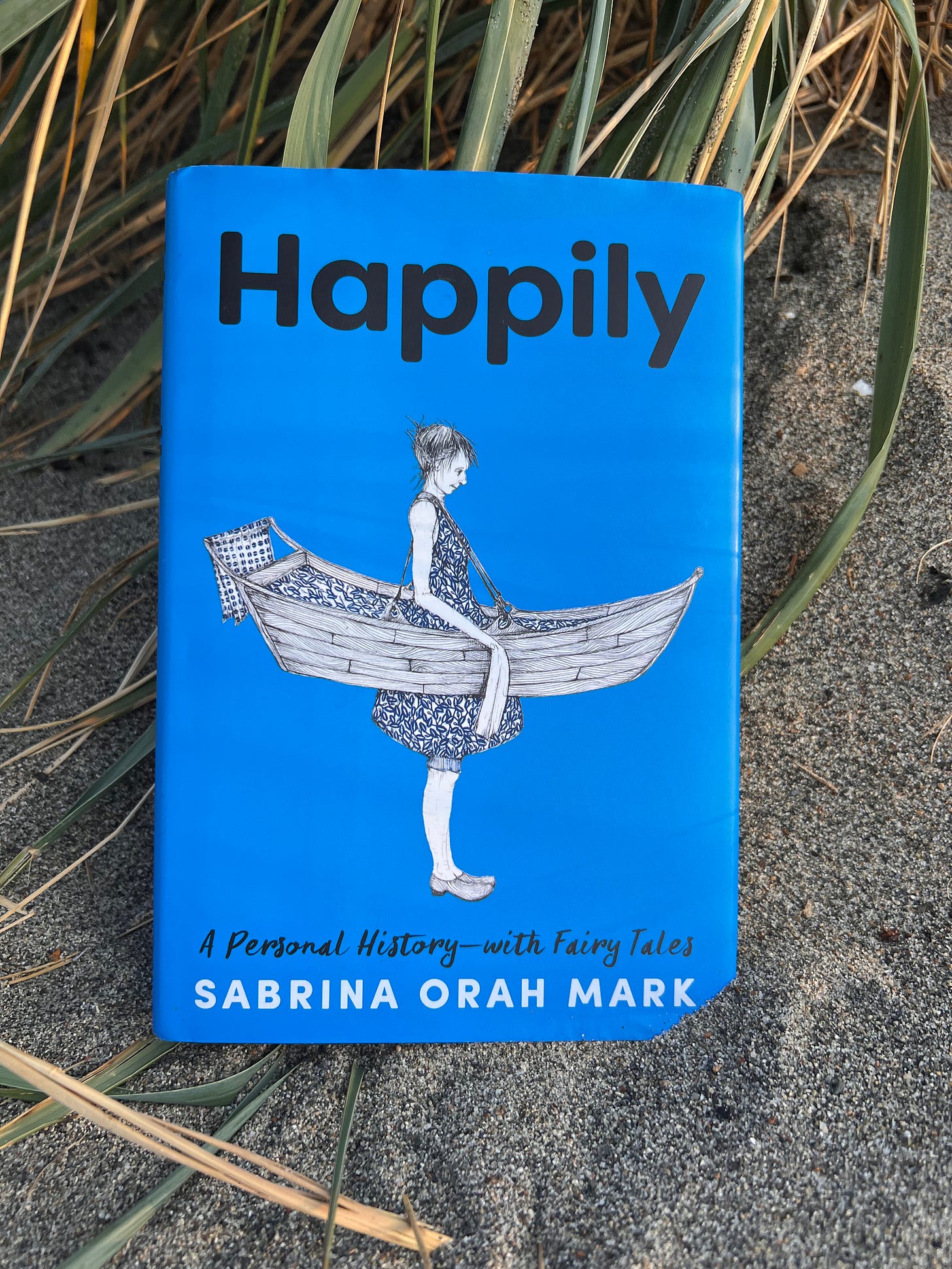One of these things doesn't belong
But it's here anyway. Super pods, super blue moons, astrology, dolls, AI-powered fact-checkers, and fairy tales
Over the weekend, after eating wild blackberries until our faces turned purple, we caught a glimpse of dorsal fins in Cattle Pass. Orcas! I'd heard there was a super pod, the J, K, and L pods, on the west side of the island. But an actual sighting brought glee. Leaps in the sand! As the pod curved around the cape, trailed by whale watching boats, we bicycled to the bay. It's funny, for the past few days, the children had gently carried their doppelgängers, American Girl dolls, a special gift from grandparents, everywhere, including to the water’s edge, and set them in celebratory poses. Now came the time to cheer! Purple faces like face paint! I felt so pulled in.
The end of summer is bittersweet, as it's still summer, but with that seasonal Sunday afternoon mood. I want to put a pin in everything that I must do next, wait until all the berries are eaten. Then I'll set up my fall courses. I'll be lecturing undergrads again. Then I'll apply to things. Organize things. As I write this, I see the appeal of having a beautiful doll, my doppelgänger, my alter ego, to sit with me and help me imagine, to make it easier to be pulled in.

The super blue moon rises today. According to NASA.com, this is a special occurrence. The moon will appear to be extra round, hence the superlative “super.” And as the second full moon in one month, an uncommon event, it's a blue moon. The next super blue moon will be in 2037. By then, where will we be? I wrote a couple of weeks ago that "it feels morally risky to speculate because what we do now shapes what comes next.” It still does. What about horoscopes for today, which are based on the facts of stars? This is the right time to surrender to intuitive impulses, two astrologers, Chani and Kyle Thomas for the Farmer's Almanac, both say. Perhaps their alignment is because, as Callie Beusman for the New York Times writes with a pithy dig, astrology is rigorous. If a cup of tea is affected by the lunar tides, as Mary Ruefle pens in her most perfect lyrical essay, Poetry and the Moon, why shouldn't I be, or you? It's a super blue moon but once in a blue moon. However it goes, why not be pulled in?
The Gift | Cultivate your imagination (a list)
Adding to the list that I started on how to cultivate your imagination. (Read 1. 2, 3):
4. LATERALLY READ (AND SAVE YOUR BROWSER TABS)
Lateral reading is an outward act. To read sideways. Horizontally. I've used this method since before it had a name. I started when we were wading through unbundled hyperlinks in the mid-2000s. Before AI writers were in newsrooms to automate stories about corporate earnings or sports. Before ChatGPT bots wrote free term papers using invented sources. Lateral reading is an internet-born reading technique to make sense of the internet. In other words, it's all about browser tabs.
Imagine you come across a claim:
* Dog owners are nervous about vaccines for their pets because some diseases aren't as concerning as vaccine science.
* Sugar ants, which may be descendants of mitochondria, can impact epigenetic changes on DNA through bites to this body part.
* Nikola Tesla secretly told his lover that this prime number could prove the feasibility of time travel.1
An outdated—or at least incomplete—information literacy technique would be to dig deeper into the source itself for more information. To go to the link. Read the article. Read the “about” page, check the publication date, and article classification—is it opinion, news, etc. But this isn't enough.
Lateral reading has you dissecting a claim into a set of claims. Into keywords. Also, yes, check the masthead, the author, the funders, the independence. Put the words in Google, DuckDuckGo, and Wikipedia. Every search engine will surface slightly different lists. You might even try an AI-powered online fact checker, such as Factiverse, which finds sources to support or dispute claims made in news and AI-generated text. With lateral reading, you can triangulate, a technique in qualitative research to test the validity of claims by reviewing multiple independent sources.
Dates are still relevant. Use the Wayback Machine, one of the best living archives on the internet, to look for earlier iterations of a live page. Search historical pages in general. Search Google Books and public library research databases. Check out the Press Books entry on lateral reading for more examples. Or do lateral reading of lateral reading. ;-) How does it add up?
I wish I had a great hack for saving my many browser tabs. I don't. I just keep a million tabs open. Sometimes I dutifully save links to Zotero or make bookmark folders using inconsistent nomenclature. Sometimes I close them all in a cleaning frenzy. Maybe you have a better way to save your browser tabs, and if you do, do tell.
Book recommendation
Happily
by Sabrina Orah Mark
It was midnight in the kitchen when I first read Mark's words. Before the pandemic. I was close to being alone—my family was sleeping. I was meant to be drinking tea, editing my dissertation, but I was crying. In an effort to self-soothe, I wandered on the internet and, luckily, landed in a Sabrina Orah Mark essay about stepmothers. Split mothers. Monsters. Oh, her words SO delighted me, so moved me, that my tears pooled in my empty cup. And I drank it in. My familiar sadnesses tasted deeper and richer. I was touched by fairy tales—and Mark's singular take on them.
Later, in the spring of 2020, I read another essay. I'd just defended my dissertation. I was teaching online and trying to bake with the children, they were always home. I hadn't been offered any of the faculty jobs I'd applied for and was feeling sorry for myself. I again waited until everyone was sleeping to cry in the kitchen.
Fuck the Bread, the Bread is Over. This essay blew my mind. Maybe you read it too. It went viral, in those heady first months of the pandemic, probably because it was so relatable. For academic women who were also mothers in the pandemic, who study humanities, or social sciences, and were applying for jobs. Who didn't have jobs, but wanted them? How many of us were tucked away at home, working, designing classes that would not exist, and needing a paycheck? It's an extortionist's vision of work. "If you perform these tasks perfectly, you'll be rewarded with more tasks” (133). All while I'm trying to make cookies, or bread, with the children. “I watch a video on how to harvest wheat. I can't believe I have no machete. I can't believe I spent so many hours begging universities to hire me, I forgot to learn how to separate the chaff from the wheat and gently grind” wrote Mark (134).
I wasn't sure what to do next. I'm still not sure. But my mother says, if you're unsure what to do next, do laundry. Clean. This always needs to be done. So I washed everything. All the clothes. I folded the sheets. I washed the floors. I scrubbed my words out of their paragraphs and swept them into large folders, to soak, for posterity.
When I discovered Sabrina Orah Mark taught workshops on daily life, impossible worlds, and on writing “the ridiculous until it becomes a story that not only we believe in, but one that guide us,” obviously, I signed up. I signed up again. (I wrote about this on Medium).
“Fairy tales themselves are well-trodden paths. I scratch at its dirt with a stick. Letters appear like a scattering of seeds. They spell my name. They spell your name, too. Even if we've never been here before, we've been here before. I scratch at the dirt again. A small white pebble—no, a baby tooth that could easily be mine or yours—appears. We thought we lost it as children, but it's been here the whole entire time.”
- Sabrina Orah Mark, p. xvi
Her new book of magical essays, Happily, wraps daily life with fairy tales that enchant the mundane, casting everything into whimsical relief. What a relief! My favorites are Ghost People, The Nightmare of Horses, Rat-a-Tat-Tat, the Bottom Line, The Evil Stepmother—oh wait, this is the chronology of chapters. Okay, they're all my favorites. There's repetition at times, but this I love. Another relief! I feel more at home when I can see the same thing over and over, I learn that way. Don't you? And I see how things shift ever-so-slightly each time. I'm still alone at the kitchen table, but I'm drinking water, not tea, in a glass. Form is function. Tip the glass just enough and you are still alone at the kitchen table, everyone is still asleep, but you're magnified.
Until next time,
Monika
The Gift
I made up two of these claims only to discover, using Factiverse, an AI-powered fact checker, that one of them is partially true. Which one? The third is fully true, but satire. Can you find the sources?







Monika- What a great list. My favorite is perhaps: “lateral reading.” I love the way you take something so automatic into something with purposeful act.